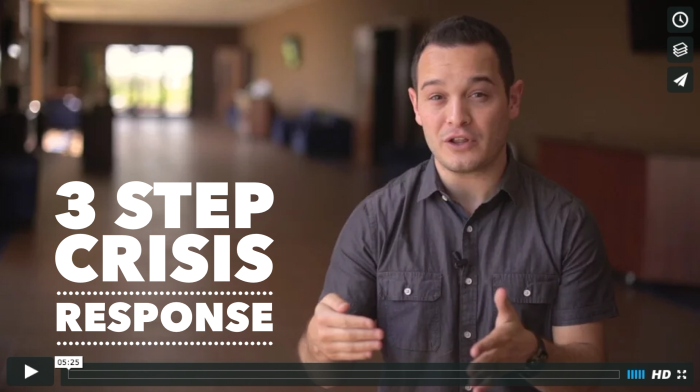by David Hanson | Oct 12, 2016 | On the Job, The Youth Ministry Blog
Over the past few weeks, I’ve been thinking through what separates “good” youth pastors from a “bad” youth pastors. While that might sound strange, I’ve been praying through how to best lead/train two staff members that are new-ish to youth ministry. What follows is what I think separates a good youth pastor from a bad youth pastor. This is by no means an exhaustive list, but what’s been on my mind, and what I covered with my team.

Good Youth Pastors prioritize time.
Bad Youth Pastors wonder where the week went.
You should approach your weekly schedule and routine the way Dave Ramsey approaches money. You can either tell your time where to go or you will wonder where it went and why you don’t have enough of it. Youth workers, please hear me! If you want to be treated like a professional in your field…then act like one. If you need more time to spend with people, more time to work on messages, or more time to invest in your own family you have to be disciplined in structuring your time.
If you need help building an ideal workweek, I have help for you here.
Good Youth Pastors involve parents and adults.
Bad Youth Pastors think they can and should handle everything.
This is something that I believe every young leader wrestles with early in ministry. In an effort to prove worth and credibility many young leaders try to tackle everything by themselves. They think that working longer hours and running solo somehow justifies their position when in reality they are doing more harm to their perception than good. Good youth workers understand the importance and benefit of bringing parents and adults on board. Parents on board with your ministry will help you tackle tasks, disciple students, and advocate for the student ministry.
This concept has been a huge push in youth ministry recently and you can learn how to do this more effectively by chasing down one of the following sources:
Check out Part 1 of Good Youth Pastor vs. Bad Youth Pastor here.
Also, check back tomorrow for the two more tips! Want to make sure you get the rest of the list? Get on our email list and you will never miss a thing!
Click Here to Join the Party
& Get a Freebie!
[guestpost]
David Hanson: Texas native, Texas Tech Red Raider, M.Div. at Truett Seminary, husband to Ashley, father to Ava, Ben & Madelyn, Student Pastor at The Fellowship in Round Rock, Tx, table tennis (ping-pong) extraordinaire, addicted to coffee. For anything else…you’ll just have to ask.
[/guestpost]
by David Hanson | Oct 11, 2016 | On the Job, The Youth Ministry Blog
Over the past few weeks, I’ve been thinking through what separates “good” youth pastors from a “bad” youth pastors. While that might sound strange, I’ve been praying through how to best lead/train two staff members that are new-ish to youth ministry. What follows is what I think separates a good youth pastor from a bad youth pastor. This is by no means an exhaustive list, but what’s been on my mind, and what I covered with my team.

Good Youth Pastors stay spiritually nourished.
Bad Youth Pastors rely on their gifts and charisma.
This feels like a no-brainer, but far too many pastors have bowed out due to moral failure stemming from spiritual malnourishment. If you are a pastor who is not prioritizing your pursuit of Jesus frustration is waiting around the corner. You can fake it for a while, but eventually you will need more than your charisma. When you try to lead a ministry out of step with Jesus you are not walking in the fullness of blessing and your ministry will suffer.
Good Youth Pastors see the full picture.
Bad Youth Pastors oil the squeaky wheel.
Youth workers are required to do A LOT. I fight tooth and nail that we have one of the most difficult jobs in the church! While people hate the implications of what I’m about to say, logistically it holds true: The youth ministry is a church within a church. (Hear me out!) Logistically, youth ministries have to execute all the duties of a church. We have to plan, train, and execute fellowship, discipleship, worship, ministry, missions, events, services, budgets, communication strategies, and leader training for our own ministry. Not to mention that we balance the expectations of staff up-lines, students, and parents while operating our ministries at the strangest hours!
Good youth pastors remember to keep the full picture in mind. Bad youth pastors oil the squeaky wheel or chase what seems to need attention rather than sticking to a plan and keeping the big picture in mind.
Check out Part 2 of Good Youth Pastor vs Bad Youth Pastor here.
Check back tomorrow for the two more tips! Want to make sure you get the rest of the list? Get on our email list and you will never miss a thing!
Click Here to Join the Party
& Get a Freebie!
[guestpost]
David Hanson: Texas native, Texas Tech Red Raider, M.Div. at Truett Seminary, husband to Ashley, father to Ava, Ben & Madelyn, Student Pastor at The Fellowship in Round Rock, Tx, table tennis (ping-pong) extraordinaire, addicted to coffee. For anything else…you’ll just have to ask.
[/guestpost]
by David Hanson | Aug 9, 2016 | On the Job, The Youth Ministry Blog
A few weeks back, I wrote a piece discussing whether youth ministries should split summer camp between high school and middle school. You can read that post here. After heading to Student Life in Estes Park, CO with my High School students, I’m ready to finish my assessment and opinion on splitting summer camp.

What were the benefits of splitting?
First, splitting camps allowed us to be laser focused.
Let me state the obvious: Middle school students and high school students have different expectations of camp. Splitting camps allowed us to focus our energy on the wants, needs, and desires of both demographics.
Our high school students love extended worship with just our own group and our middle school students love the freedom to roam, play more, and just be active. It was refreshing to be able to provide both without compromising.
Second, splitting camps allowed us to develop relationships.
Yes, relational growth happens at every camp, but here is what I’ve noticed. When you do camp together, high school students tend to monopolize the time of leaders, leaving less intentional time with middle school students.
By nature, adult volunteers tend to identify more with high school students in that they enjoy conversation and lack the endless fountain of energy that is a middle school student. This isn’t science, so don’t hang me, but it’s what I’ve seen at camp even when we make a strong emphasis for leaders to prioritize 6th-8th students.
But David, isn’t this why you bring leaders to focus on specific grades/demographics? Yes, of course, but nothing beats making those grades/demographics the sole focus for an entire week. When 8th graders are not under the shadow of upperclassmen they feel the freedom to step up and lead. When middle schoolers aren’t afraid to look silly in front of upperclassmen they let loose and it’s awkwardly amazing!
What were the drawbacks of splitting camp?
I’m exhausted! When you are out of town three out of six weeks to multiple camps and mission trip, up becomes down, mass hysteria sets in, your family doesn’t recognize you, and you come home to an inbox with 200+ unread emails.
I tend to exaggerate, but on the real, my eight month old daughter started crawling while I was at high school camp, so it felt that way…
Another drawback was that momentum felt weird. I came out of middle school camp hyped about the relationships built but didn’t feel like I got to follow through with those students until after high school camp and the mission trip…5 weeks later.
When you have to begin preparation for the next trip immediately upon return, it’s difficult to celebrate, recognize, rest in all that God accomplished.
The school system has essentially turned summer into a two-month sprint. Somehow our church squeezed middle school camp, high school camp, mission trip, a VBS for our two campuses, iWorship (kids), and family camp into eight weeks. That’s six weeklong events in eight weeks…insane!
So would you split camp again?
The jury is still out. (Really David, after all this you won’t give us an answer?) That’s right. There were more pros than cons, but as an optimist, I could come to the same conclusion if we did camp together. I’ll leave you with this. If you have the numbers, budget, volunteers, and bandwidth to try it…try it. We are now processing what next summer will look like and I’ll update this page, when we make the decision!
Click Here to Join the Party
& Get a Freebie!
[guestpost]
David Hanson: Texas native, Texas Tech Red Raider, M.Div. at Truett Seminary, husband to Ashley, father to Ava, Ben & Madelyn, Student Pastor at The Fellowship in Round Rock, Tx, table tennis (ping-pong) extraordinaire, addicted to coffee. For anything else…you’ll just have to ask.
[/guestpost]
by David Hanson | Jun 29, 2016 | On the Job, The Youth Ministry Blog
This year we tried something we have never done before. We took a leap of faith and split our Middle & High School Camp. Last year we took 148 to Student Life in Glorieta, NM and had been going to Glorieta for the previous 3 years. This year, however, we felt it was time for a change. Not only would we pick a different location, but we would split our Middle & High School Camps. Here are my thoughts after returning from Middle School Camp:

What led to the decision?
First, it’s important to note that we made the decision to split out our camps after attending the Middle School Ministry Campference, or just “Campference,” put on my Marko and The Youth Cartel (this is an excellent choice if you are looking for a place to spend your conference budget this year).
At the Campference we got to hear a lot about CIY “Christ in Youth,” met a few of their leaders, and learned about MIX which is specifically designed for Middle School students.
Having just separated our Sunday morning programming to a Middle School and High School hour, we thought, “Why not? If we are splitting our Sunday programming to be more intentional with our Middle School students, why not split our Summer Camp for the same reasons?” So we pulled the trigger. This year we took 88 to MIX at the University of Central Oklahoma in Edmond and have 80 signed up to go with us to Student Life in Estes Park, CO.
So how did the students respond?
Being the first time we split MS/HS for summer camp we did run into a few situations. Primarily, our 8th graders were not fans of this decision. But to be honest, they were not fans of us splitting the Sunday services either. At this point, they identify more with the classes above them, than they do with the classes below them. However, we know their presence in the Sunday Middle School service and on the Middle School trip would allow this grade to step into a role of leadership rather than just being the middle child during both.
While unpopular with our 8th graders, the 8th graders who did attend camp stepped up into some serious leadership. At the beginning of the week they were timid and hesitant, but by the end of the week they were exhorting younger students and leading the way.
Our 6th & 7th grade students loved being the center of attention for the week. While they enjoy the older students in our ministry, I think they felt a certain degree of ownership of the trip. They were less hesitant to speak up, be silly, be themselves, and volunteer for games, prayer, etc. I have a feeling that if we were to split our camp again next year, the new 8th graders would be all about being the top dogs on campus.
So what did you think as a youth pastor?
Let’s start with the positives: From a leadership perspective, I was blown away by how thoughtful and intentional MIX was with their programming (read presentation from stage). It would be impossible for a middle school student to get bored or lose focus during a session at MIX. They thought through every aspect of what a middle school student wants and how they think and respond during a session. They blended worship, teaching, games, videos, and skits flawlessly to convey a consistent theme (Kingdom Workers) and hold the attention of middle school students. Consider that a high praise as I’ve gone to camps as a student for 6 years and a youth worker for 10.
Furthermore, their recreation time was well thought out and not just an afterthought. You could see the time and creativity they put into making sure recreation was not just some combination of tag or dodge ball. They built entire backstories, complete with videos, into their rec time activities that encouraged students to engage and not just zone out. Their rec leaders were not just random college students, but THE BAND! You heard me right. They had the different band members lead each team at rec.
The worship team was not just there to lead from the stage, but they led off the stage, which got many students even more excited about worship. While High School students might prefer the “celebrity worship leaders,” this was the right call for Middle School students.
I can’t say enough about how impressed I was with what MIX provided for Middle School Students. The only hiccups during the week had more to do with the location of the camp and the college campus. More specifically, I was underwhelmed by the free time options. In high heat temperatures there was no access to an indoor gym and there was no water options on campus.
The only option for free time was to play gaga ball, 9-square, ultimate Frisbee, and soccer (all of which we have at home). This was a downer after having been at camps the past 5 years where we had access to a lake/water activities, ropes course, bmx course, hiking, etc. I feel like the same programming on a campground with more free time options would have been perfect.
In addition to few free-time options, the campus expected Middle School students to keep up with a room key and a meal card. Not terrible, but each lost key cost $55 and lost meal cards were $10. That’s like handing a middle school student $65 dollars cash and asking them not to lose it in the course of a week…impossible! We had to come up with a system, but this could have been prevented if we were allowed to leave doors unlocked and only needed a wristband to get in the cafeteria.
So would you split summer camp again?
I have been asked multiple times if I will split camp again next year. If I had to decide this instant, I would totally do MIX again at a different location! However, I reserve the right to change my mind after High School Camp in two weeks. The only thing I miss so far is the opportunity for High School students to pour into Middle School students and the opportunity for Middle School students to watch the way that High School students worship and pursue Jesus.
Stay tuned for my follow up-post after High School camp! Want to make sure you don’t miss the full review? Sign-up to receive post updates delivered straight to you inbox!
Click Here to Join the Party
& Get a Freebie!
[guestpost]
David Hanson: Texas native, Texas Tech Red Raider, M.Div. at Truett Seminary, husband to Ashley, father to Ava, Ben & Madelyn, Student Pastor at The Fellowship in Round Rock, Tx, table tennis (ping-pong) extraordinaire, addicted to coffee. For anything else…you’ll just have to ask.
[/guestpost]
by David Hanson | Jun 17, 2016 | On the Job, The Youth Ministry Blog
Summer is here and “Project Survive and Thrive” is in full effect. This season can be one filled with immense joy and solid ministry, but it can also be a dangerous season for youth pastors. Here are 4 warnings for summer in youth ministry.

1. Don’t sacrifice your soul for productivity.
As you run in a million directions to camps, retreats, mission trips, VBS, random hangouts, organized events, and weekly activities don’t sacrifice your relationship with Christ for productivity. While being everywhere at once and running non-stop until September seems like faithful ministry, a failure to prioritize your faith development and pursuit of Christ will damage your ministry in ways you’ll never know. Furthermore, the ministry that does take place will not be near as fruitful.
Response: Schedule your Quiet Time. What time of day can you be intentional? Pick a study or book that excites you. Partner with another youth pastor for accountability.
2. Don’t sacrifice your family to summer.
If I’m being honest, summers in youth ministry are the hardest on my marriage. Even after nine years of marriage while in youth ministry my wife and I find June and July to be the most straining on our marriage and family. How could it not be? I will be out of town/country 3-4 weeks and when I am in town, my time is consumed with the next youth event/Bible study/hangout.
Response: Calendar date nights and family nights and then honor the commitment. Plan a family vacation or get-away for August or September to refresh and reconnect.
3. More events doesn’t equate to a better ministry.
While some youth ministries scale up in the summer other youth ministries scale down. There is not right or wrong answer to this as it is completely dependent upon your context. In my context, we scale up, but this doesn’t include adding a ton of new stuff to the weekly calendar.
Rather than simply adding more activities, we scale up our regular events, and then pepper in a few Bible studies lead by our college interns. Adding more events to you calendar does not mean you are doing better ministry. In fact, adding more to your plate may cause attrition in the quality of your ministry. I would rather do a few things well than a lot of things mediocre.
Response: Have you planned to much? Do you need to scale back? Can you scale back? How will you focus on quality and stop worrying about quantity?
4. Don’t lose sight of your fall calendar.
Summer will fly by. You will look back two and a half months from now and wonder where the time went. If you fail to prepare for the fall, you will be scrambling when back to school arrives. My team is laying the ground work for our Fall Retreat and will use August to finalize the fall details. Furthermore, what does your communication to parents and students look like as you prepare for the new school year? What is your plan for Promotion Sunday? How will you re-launch and communicate your weekly events? Don’t let these things sneak up on you!
Response: Plan a brainstorming session with your team to talk through these details. Are you a lone ranger youth worker, start by building a team that can help you look ahead!
[guestpost]
David Hanson: Texas native, Texas Tech Red Raider, M.Div. at Truett Seminary, husband to Ashley, father to Ava, Ben & Madelyn, Student Pastor at The Fellowship in Round Rock, Tx, table tennis (ping-pong) extraordinaire, addicted to coffee. For anything else…you’ll just have to ask.
[/guestpost]

by David Hanson | Mar 31, 2016 | On the Job, The Youth Ministry Blog, Youth Ministry Videos
Question: Do your leaders know what to do if a student comes to them in a crisis? As I met with my Small Group Leaders over the past month, a common desire was to know how to respond to students walking through a difficult season. For this reason, I shot a video to cover our 3 Step Crisis Response. Check it out:
3 Step Crisis Response from The Fellowship Round Rock on Vimeo.
In this video I covered the three steps I want our Small Group Leaders to take when a student approaches them with a crisis situation.
- Clarify – Before jumping to conclusions or dismissing a statement as irrelevant, it’s important to clarify what a student is saying. Use phrases like: What do you mean? Explain that to me. What does that look like? This will ensure you are seeing and understanding what the student is actually telling you.
- Notify – When a student confesses that they are walking through a troubling time, it’s always the best bet to play it safe and relay the situation to a paid staff member. They will help you with your response and determine what steps need to be taken next. As a youth worker, you are a mandated reporter and must notify the appropriate authorities if a student confides that they are in harms way. When it doubt…notify the youth pastor!
- Follow-through – It doesn’t matter if the crisis situation was monumental catastrophe or a momentary unwarranted worry, you will earn the trust of students if you follow-through. In the follow-through you get to be pastoral and regardless of the situation, point them back to the love, grace, mercy, and comfort of Christ.
I hope this helps you think through how you are communicating with leaders and encourage you to steal this video or remake it yourself. Just give your leaders a plan for crisis situations!
Like what you read? Join our mailing list and I’ll send you a special bonus!
Sign-up & Send Me a Bonus!
[guestpost]
David Hanson: Texas native, Texas Tech Red Raider, M.Div. at Truett Seminary, husband to Ashley, father to Ava, Ben & Madelyn, Student Pastor at The Fellowship in Round Rock, Tx, table tennis (ping-pong) extraordinaire, addicted to coffee. For anything else…you’ll just have to ask.
[/guestpost]







